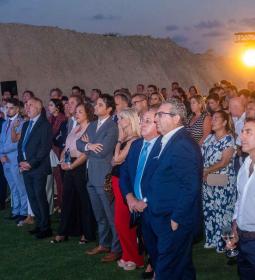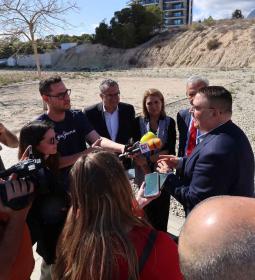The mayor points out that this “singular” project is the result of “public-private collaboration” and is linked to 4 SDGs
The developer of Poniente sector plans to restore E Racó de l’Infern quarry environmentally and transfer it to the City Council

<p>The regeneration will be done with the leftover land of PP 2/1 and includes planting more than 2,500 trees and about 3,650 shrubs, all of native species</p>
Benidorm City Council will transfer to the Ministry of Ecological Transition the project presented at the municipal headquarters by the urban agent of the Partial Plan 2/1 Poniente and the Unit of Action 1 Poniente, TM Real Estate Group, to restore the quarry environmentally and landscape of Racó de l'Infern. This has been announced today by the mayor, Toni Pérez; the city councilor, Lourdes Caselles; and the director of Urban Planning of TM, Cristóbal Ruiz; in a press conference in which they have transferred all the details of this project, which aims to recover this space of just over 60,000 square meters mostly located in Serra Gelada Natural Park, and which is also a Place of Community Interest (PCI) and Special Protection Area for Birds (ZEPA).
The mayor has indicated that it is “a unique project; a city project and for the city, and that is linked to 4 Sustainable Development Goals of the 2030 Agenda ”. It is, therefore, “a project totally in tune with our development strategy, with our commitment to compliance with the SDGs, and with the policies that from the local administration, often in close collaboration with other institutions or public and private entities , we are boosting to make Benidorm an increasingly sustainable city with a better quality of life ”.
Pérez detailed that this quarry is located “behind the roundabout where the streets London, Paris, Viena and Oslo converge; and their pedestrian access is located in front of ‘Pepita Puchades’ Employment Center ”; and added that the intention of the company is "to restore this old mining hole and then transfer the land to the City Council."
As explained, this restoration "is going to be done with the appropriate inert waste from the surpluses of the earth movements that TM carries out in the urbanization of Poniente area"; and that the director of Urbanism of the group has put in “about 178,000 cubic meters”. "Land leftovers" that "instead of being transported to a landfill at a distance of not less than 20 kilometers" will be contributed to the old quarry "thus reducing the carbon footprint." In this way, he explained that the project "follows the philosophy of the three R: reduce, reuse and recycle."
The mayor advanced that the project "has an execution period of 9 months" and "will be developed in four phases" once the authorization is received from the Regional Goverment, which must issue the corresponding Environmental Impact Study. However, "there is an action that can be started as soon as the development of PP2 / 1 begins, since the Natural Park is not affected."
In the first phase of the project it is intended to condition the current access to the quarry to allow the safe transit of trucks that will transport the materials for restoration. Then, the work area will be cleared, and the invasive plants removed to start the morphological restoration phase of the old quarry's hole.
Once this phase is completed, the soil will be prepared for reforestation and a drainage network will be built to avoid dragging. Then the reforestation will be carried out in two differentiated areas: the 1, which corresponds to the old square of the quarry; and 2, which coincides with the slopes resulting from the morphological restoration.
This reforestation, the mayor deepened, “is going to be done with native trees and shrubs of which there are still specimens in the area such as pine, olive, carob, palm, black hawthorn, lentisks and rosemary. In total we talk about more than 2,500 trees and about 3,650 shrubs. ”
Cristóbal Ruiz clarified that this action restores “the profile of the mountain”, recreates “a Mediterranean forest that generates an ecosystem that favors a biodiversity of flora and fauna”, and leaves “a bit of rock from the quarry, following the instructions of the technicians of Natural Spaces of the Ministry, to favor the life of the birds of prey on the rocky wall that exist in the environment.
The mayor has advanced that if the processing of the project is agile "for the spring of 2021" Benidorm will enjoy "a new space" designed for "leisure and tranquility with absolute accessibility with the urban plot of the upper part of Rincon de Loix "
Sustainable Development Goals
As explained by the mayor, this project is linked to the fulfillment of 4 SDGs. In the first place, “it contributes to Objective 11 of 'Sustainable cities and communities', since this restoration is going to be carried out with the appropriate inert waste from the surpluses of the earth movements that TM carries out in the urbanization of the West zone ”. Thus, "the transfer of this waste to a landfill is avoided, thereby reducing CO2 emissions."
On the other hand, “it promotes Objective 13,‘ Adopting urgent measures to combat climate change and its effects, ”since restoring this space affected by mining exploitation restores the ecosystem's functionality and activates its plant regeneration. In addition, the landscape is recovered within a protected space and rainwater is channeled, protecting this soil and its environment from erosion. ”
Likewise, “the project advances in Objective number 15, of‘ Life of Terrestrial Ecosystems ’; and it is linked to SDG 17 ‘Alliances to achieve the objectives’, in this case “from public-private collaboration”.
Project magnitude
The director of Urbanism of TM highlighted some significant figures of this project that "is part of our corporate social policy", and "makes us very excited to carry out in Benidorm." According to the data provided by Ruiz, this action “reduces 1,796 tons of CO2 for 40 years”, “compensates for 40% of GHG emissions - greenhouse gases - from the Industrial Sector”, “multiplies by 3 the green areas of the PP 2/1 ”, and is equivalent to“ half of the great 'green lung' designed in Ensanche de Levante ”.
Ruíz indicated that this action implies “an investment of 1.5 million euros”, but that it “is neutralized, because it was a budget item that was going to be spent with the transport and dumping of the material” of PP2 / 1. However, "due to company policies to improve the environment and respect the climate we assume this investment and the management effort involved in processing and executing this restoration project."





